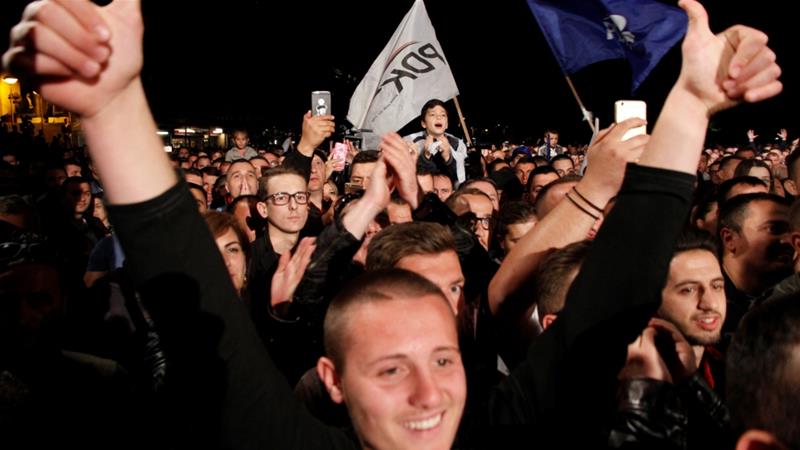By Shqipe Mjekiqi (R.I.T Kosovo)
Early parliamentary elections were held in Kosovo on 11th June, as the coalition between the Democratic Party of Kosovo (PDK) and the Democratic League of Kosovo (LDK) broke out a month ago. Interestingly, this happened even though a parliamentary motion against the Government was raised by the PDK splinter party NISMA, and point 14 of the Political Agreement between PDK and LDK read that the two ‘will not support a vote of no confidence initiated by other parties in parliament’. In practical terms, PDK supported a vote of no confidence against its own government.
The coalition managed to get some things done during its less than three years in power;[1] among those LDK helped its partner elect as President of the country former PM Hashim Thaci back in February, which was also part of the agreement. But, it failed to ratify the border demarcation agreement with Montenegro which could possibly pave the way for Kosovo’s visa liberalization with the EU Schengen countries. While PDK justified its support for the motion on the ‘inability of the Parliament to reach important decisions’, such as the one on demarcation, few believed PDK wasn’t the one who organized it. After all, PDK contested the elections along with NISMA and the Alliance for the Future of Kosovo (AAK), all of which emerged out of the Kosovo Liberation Army (KLA), in a ‘grand’ pre-electoral coalition.
The other two major parties, LDK [2] and Vetëvendosje!, were unable to reach an agreement among themselves despite attempts to do so and hence contested the elections separately. Altogether, twenty-six entities (parties and initiatives) contested the elections including a number of them from the Serb, Bosniak, Turkish, Roma, Ashkali and Egyptian minority communities. Out of the 120 parliamentary seats, 20 are guaranteed for minority communities provided they participate in elections.
Although in the past there have been problems with election management including allegations of vote fraud, this year the elections were considered to be fair and democratic. Nevertheless, some issues still stand out; most importantly the voters’ list which accounted 1,872,941 registered voters, hence greater than the population of Kosovo 1,739,825. [3] The Central Election Commission (CEC) argued the high number was a result of registered voters who now live abroad, yet it is well known that the dead also feature in the voters’ list as largely reported by family members of the deceased.
On the eve of the elections, as polls closed, major problems with vote reporting were evident on CEC’s website. While the latter fell behind in reporting, a coalition of local NGOs – ‘Demokracia ne Veprim’, which observed the elections among many other local and international observers, was updating the results with accuracy. The following day, CEC picked up electronically only to confirm the results.
Overall 766,162 voters cast their ballots in a relatively low 41% turnout. The PDK-led coalition won 34% of the votes while LDK got 26%. A major victor was considered Vetëvendosje! which came second with 27% of votes, doubling its support since last elections. As people claimed, they ‘voted for change’ by refusing to support the parties which have been in the scene since the war ended in 1999. Srpska Lista, one of major Serb parties, got 6% with the remaining votes going to smaller and other minority parties, which barring the latter will not gain any seats in parliament because of the 5% threshold.
It will be difficult for PDK-led coalition to form a government with about 39 seats it will gain in Parliament provided that Vetëvendosje!, and LDK will refuse to form a coalition government with them. The votes from minority parties will not be sufficient to help them form a government, let alone enact legislation which requires simple (61 votes) or even two-thirds (80 votes) majority voting. An alternative will be a government made up of Vetëvendosje! and LDK, similar to what happened recently with the opposition formed government in Macedonia, but it is unclear whether President Hashim Thaci will, as per the Constitution, invite the parties to do so. A government is nevertheless much needed at this time when border demarcation awaits approval and the special court should come in place. After all, people voted for change so a PDK-led government will doubtfully satisfy peoples’ will.
Footnotes:
[1] It had taken six months to form a government as a result of the December 2014 elections.
[2] LDK formed a coalition with the Alliance for the Future of Kosovo (AKR) and the newly formed Alternativa.
[3] As per the 2011 census. Excluding four municipalities populated by Serb majorities.
Photo source: http://www.aljazeera.com/news/2017/06/kosovo-fighters-declare-victory-general-election-170612035454513.html


